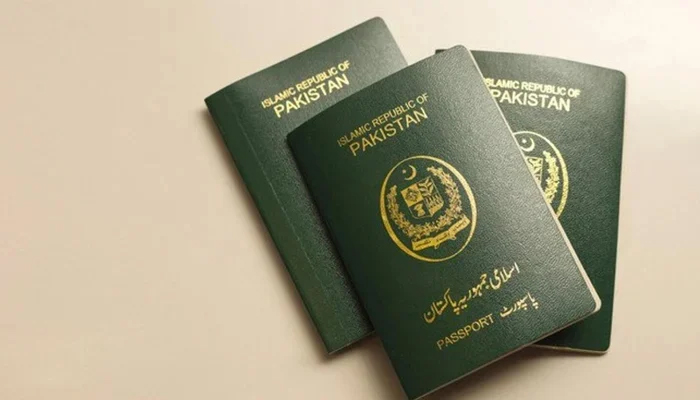Pakistani passport still fourth-worst in the world
Around 199 passports have been analysed for ranking which is based on number of countries/territories (destinations) passport holders can access without a prior visa
KARACHI: Travellers in Pakistan are in for some bad news: the Pakistani passport has shown no improvement and continues to remain the world’s fourth-worst passport -- a position it has maintained for at least the last five years.
According to the Global Mobility Report 2024 published by Henley & Partners, a UK-based global citizenship and residence advisory firm, Pakistan’s passport ranks 101st (out of 104) on the Henley Passport Index with a score of 34. This means that citizens with an ordinary Pakistani passport can have visa-free access to only 34 out of 227 destinations included in the index.
Around 199 passports have been analyzed for the ranking which is based on the number of countries/territories (destinations) passport holders can access without a prior visa. The index is based on data from the International Air Transport Association (IATA).
This year, the top slot for the world’s strong passport is occupied by six countries – France, Germany, Italy, Japan, and Singapore have ranked first on the index with a score of 194. In 2023, the first and second spots were occupied by Singapore and Japan respectively. For France, Germany and Italy, the first position translates into a significant two-spot jump; the three countries shared the third spot with four other countries last year.
Three countries are tied in the second spot with a score of 193 -- Finland, South Korea and Sweden. The third spot is shared by four countries with a score of 192: Austria, Denmark, Ireland, and the Netherlands.
Afghanistan continues to occupy the slot for the world’s worst passport with its citizens enjoying visa-free entry to only 28 destinations. The second- and third-worst countries are Syria and Iraq, providing access to 29 and 31 destinations respectively.
Though other South Asian countries have performed better than Pakistan, their overall ranking remains low. Bangladesh ranks 97, with visa-free access to 42 destinations. Sri Lanka is only one spot ahead – at 96 with a score of 45. Nepal comes at the 98th spot with a score of 40. Only India has performed better in the South Asian region and enjoys the 80th spot with a score of 62.
The Pakistani passport gives visa-free access only to the following destinations: Barbados, Burundi, Cambodian, Cape Verde Islands, Comoro Islands, Cook Islands, Djibouti, Dominica, Guinea-Bissau, Haiti, Kenya, Madagascar, Maldives, Micronesia, Montserrat, Mozambique, Nepal, Niue, Palau Islands, Qatar, Rwanda, Samoa, Senegal, Seychelles, Sierra Leone, Somalia, Sri Lanka, St Vincent and the Grenadines, Timor-Leste, Togo, Trinidad and Tobago, Tuvalu, and Vanuatu.
Chairperson of Henley & Partners Dr Christian H Kaelin says that “although the general trend over the history of the 19-year-old ranking has been towards greater travel freedom, the global mobility gap between those at the top and bottom of the index is now wider than ever.”
“The average number of destinations travellers are able to access visa-free has nearly doubled from 58 in 2006 to 111 in 2024,” he adds. This means that “the top-ranked countries are now able to travel to a staggering 166 more destinations visa-free than Afghanistan, which sits at the bottom of the ranking with access to just 28 countries without a visa.”
Experts also point to the growing use of technology to perform travel-related tasks. IATA Senior Vice President Commercial Products and Services Frederic Leger says that “with passenger traffic set to double by 2040, the optimization and enhancement of airport processes will need to continue. Checking and verifying travel documents needs to be automated to a much higher degree. Passengers have clearly communicated that they are willing to share their data in advance of travel to achieve this goal.”
-
 Prince William Steps In To Help Farmer's Awareness Mission
Prince William Steps In To Help Farmer's Awareness Mission -
 Queen Elizabeth Tied To Andrew's Sexual Abuse Case Settlement: Report
Queen Elizabeth Tied To Andrew's Sexual Abuse Case Settlement: Report -
 Mark Ruffalo Urges Fans To Boycott Top AI Company Boycott
Mark Ruffalo Urges Fans To Boycott Top AI Company Boycott -
 Prince William Joins Esports Battle In Saudi Arabia
Prince William Joins Esports Battle In Saudi Arabia -
 Princess Beatrice, Eugenie Are Being Ripped Apart: ‘Their Relationship Is Fully Fractured’
Princess Beatrice, Eugenie Are Being Ripped Apart: ‘Their Relationship Is Fully Fractured’ -
 Arden Cho Shares Update On Search For ‘perfect’ Wedding Dress Ahead Of Italy Ceremony
Arden Cho Shares Update On Search For ‘perfect’ Wedding Dress Ahead Of Italy Ceremony -
 Ariana Madix Goes Unfiltered About Dating Life
Ariana Madix Goes Unfiltered About Dating Life -
 Prince William Closes Saudi Arabia Visit With Rare Desert Shot
Prince William Closes Saudi Arabia Visit With Rare Desert Shot -
 Priyanka Chopra Breaks Silence On Rumors Questioning Marriage To Nick Jonas
Priyanka Chopra Breaks Silence On Rumors Questioning Marriage To Nick Jonas -
 'King Charles Acts Fast Or Face Existential Crisis' Over Andrew Scandal
'King Charles Acts Fast Or Face Existential Crisis' Over Andrew Scandal -
 Brooklyn Beckham Charging Nearly £300 In Ticket Cost For Burger Festival
Brooklyn Beckham Charging Nearly £300 In Ticket Cost For Burger Festival -
 Prince William Makes Unexpected Stop At Local Market In Saudi Arabia
Prince William Makes Unexpected Stop At Local Market In Saudi Arabia -
 Zayn Malik Shares Important Update About His Love Life
Zayn Malik Shares Important Update About His Love Life -
 James Van Der Beek's Celebrity Pals Pen Touching Tribute After His Death
James Van Der Beek's Celebrity Pals Pen Touching Tribute After His Death -
 Kate Middleton, William Are Holding Onto Their Hats As Worse Gets Threatened: Behind The Veil Of Shame
Kate Middleton, William Are Holding Onto Their Hats As Worse Gets Threatened: Behind The Veil Of Shame -
 British Soap Awards Scrapped Again As ITV Confirms 2026 Hiatus
British Soap Awards Scrapped Again As ITV Confirms 2026 Hiatus




